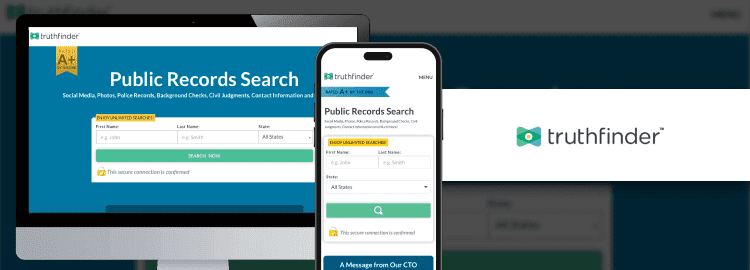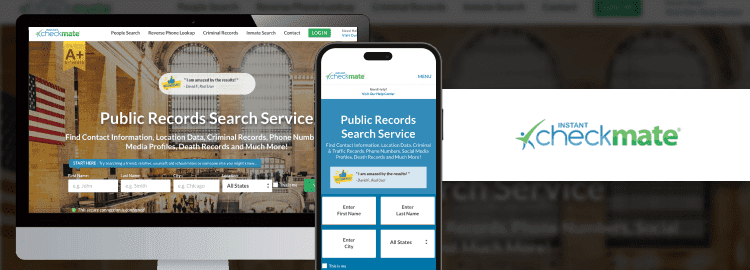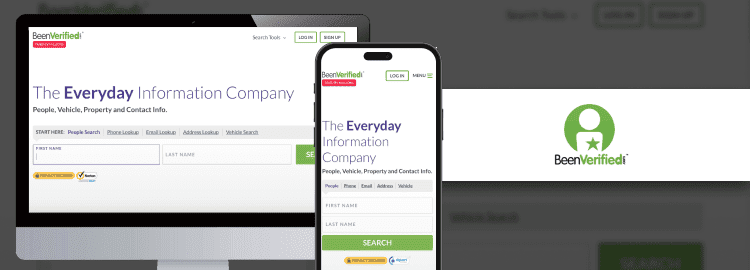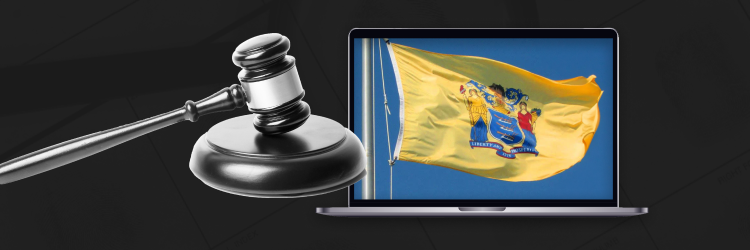Background checks are an important tool for ensuring the safety and integrity of various interactions. You can use them for multiple purposes, from hiring employees to renting out properties. New Jersey background checks can show criminal histories, past employers, academic credentials, and more.
We’ll explore the essentials of a NJ background check process. Learn details about how to get one, what information shows up, the most important federal laws, and more.
Need a Background Check?
What Is a New Jersey Background Check?
Getting a Jersey State background check involves reviewing various records and information about an individual. The report can include criminal records. Additionally, it covers work history, education verification, and credit reports.
Employers, landlords, and even individuals conduct these checks. Anyone can use them to make informed decisions about hiring, renting, and other big actions. New Jersey state agencies play an important role in providing these records. Such organizations ensure the information is accurate and up-to-date.
How Do I Get a State Background Check in New Jersey?
Here’s a step-by-step guide:
- Visit the NJ State Police website: Go to the official website of the New Jersey State Police to find information on background checks.
- Select the appropriate service: Choose whether you need a personal background check or one for employment purposes.
- Complete the necessary forms: Fill out the required forms provided by the New Jersey State Police. Ensure all information is accurate to avoid delays.
- Schedule an appointment for fingerprinting: Background checks often require fingerprinting, which can be done at an approved IdentoGO site.
- Pay the fee: There is a fee for the fingerprinting service, typically around $45.73. Payment methods include credit cards, prepaid debit cards, or electronic debit from a checking account.
- Submit fingerprints: Attend your appointment at the IdentoGO site and provide your fingerprints.
- Receive your report: The results will be processed and sent to you, usually within two weeks.
What Shows Up on a New Jersey Background Check?
A New Jersey background check can reveal a wide range of information, depending on the types of checks conducted. Here are some common types of background checks and what they typically show:
Civil Court Searches
Civil court searches provide insight into an individual’s involvement in non-criminal legal matters. Information about legal disputes and financial obligations may affect their suitability for certain roles.
- Civil judgments
- Lawsuits
- Claims
Drug Testing
Drug testing is often a part of pre-employment background checks to ensure a drug-free workplace. The tests screen for substances that could impair a person’s ability to do their job safely and effectively.
- Presence of alcohol
- Illicit drugs
- Certain prescription medications
Criminal Background Checks
Criminal background checks can reveal an individual’s history with the criminal justice system. The investigation has detailed information about any criminal offense.
- Misdemeanor and felony convictions
- Pending criminal cases
- Arrest records
- Conviction records
- Sex offender registry information
- Details such as date of offense, type of offense, severity, disposition, disposition date, and sentence
Employment Verification
Employment verification checks confirm the accuracy of an applicant’s job history. This process helps employers ensure that candidates have the experience and qualifications they claim.
- Previous employers
- Employment dates
- Job titles and roles held
Credit Background Checks
Credit background check reports highlight an individual’s financial history. The checks are vital for jobs that involve money. The history report shows how the person manages their finances.
- Bankruptcies
- Accounts in collection
- Payment histories
Driving Record Checks
Checking someone’s driving history is essential for jobs where they’ll have to operate a vehicle. Motor vehicle records provide a detailed review, ensuring that they have a valid license and a safe driving record.
- Traffic violations
- Accidents
- License status
Education Verification
Education checks confirm an applicant’s academic qualifications. This review lists details about previously attended educational institutions. Ultimately, it helps employers verify that candidates meet the required educational criteria.
- Institutions attended
- Attendance dates
- Degrees or certifications earned
What Are the Background Check Laws in New Jersey?
Let’s break down the Jersey laws governing background checks in the state.
New Jersey Fair Credit Reporting Act (NJFCRA)
The NJFCRA sets guidelines on how an employer decides to use investigative consumer reports. The law requires the user’s consent before obtaining the information. Also, the adverse action process mandates that NJ employers must give the applicant a copy of the report should it negatively affect their employment opportunity.
New Jersey Opportunity to Compete Law (Ban the Box Law)
Commonly known as the “Ban the Box” law, it restricts when employers and landlords can ask about a candidate’s criminal history. Neither can inquire about this information on initial applications, ensuring that individuals are evaluated first on their qualifications and suitability.
New Jersey Law Against Discrimination (NJLAD)
NJLAD protects against discrimination based on various characteristics, such as race, gender, age, and disability. This law applies to Jersey background checks, ensuring that decisions are not based on discriminatory factors.
Federal Fair Credit Reporting Act (FCRA)
The FCRA is a federal regulation governed by the Federal Trade Commission. The act oversees the acquisition, distribution, and application of consumer data. It ensures accuracy, fairness, and privacy, requiring entities to notify individuals when their information is used for decisions and to obtain consent beforehand.
Federal Civil Rights Act of 1964, Title VII
Title VII is a civil rights law implemented by the Equal Employment Opportunity Commission. This federal law prohibits employment discrimination based on race, color, religion, sex, or national origin.
This law affects how background checks are used in hiring and employment decisions. It ensures they are not done in a discriminatory way.
New Jersey Security and Financial Empowerment Act (NJ SAFE Act)
The NJ SAFE Act provides job protections for victims of domestic and sexual violence. It allows them to take up to 20 days of unpaid leave to deal with related issues. This law ensures that background checks and employment decisions do not negatively impact these individuals.
New Jersey Identity Theft Prevention Act
The New Jersey Identity Theft Prevention Act focuses on protecting personal information. It aims to prevent misuse and theft. The act mandates the secure handling of personal data and requires notifying people of breaches. The rules dictate how to store and use background check information.
New Jersey Expungement Laws
Various expungement laws allow individuals to remove certain criminal history information from their record. The Clean Slate Law makes them inaccessible during background checks. This helps individuals with past offenses rebuild their lives without the burden of old records.
Local New Jersey Fair Hiring Laws
New Jersey laws require fair hiring. They ensure that all have job opportunities without bias or discrimination.
The New Jersey Fair Employment Practices Act is a crucial piece of legislation that protects individuals from discrimination based on various characteristics.
The protected traits include race, color, and national origin. They also include age, marital status, sexual orientation, gender identity, and disability. The goal is to provide an equal playing field for everyone seeking employment.
The state laws cover many local areas, including Newark, Jersey City, Atlantic City, and Camden.
Businesses and governments in these areas must follow the same fairness and non-discrimination standards. This promotes a more inclusive and fair work environment.
How Far Back Does a Background Check Go in New Jersey?
In New Jersey, federal and state laws limit how far back an employment background check can go. For jobs paying less than $75,000 per year, there is a seven-year lookback period on reporting certain info, such as:
- Civil lawsuits
- Liens
- Bankruptcies
- Civil judgments
- Arrests not leading to convictions
Jersey state laws set these limits. Information older than seven years will not appear in a background check. However, this restriction does not apply to criminal convictions. For positions with salaries of $75,000 or more, New Jersey employers may look beyond the seven-year period.
How Long Does a Background Check Take in New Jersey?
Completing a background check in New Jersey takes about two weeks. It starts when the applicant submits fingerprints. Further investigation may require a longer period. Applicants no longer get physical letters with the state seal. Instead, results are often sent electronically.
How Do I Get My Criminal Record in New Jersey?
To get a Criminal History Record Information (CHRI) check in New Jersey, residents must give their fingerprints using an electronic live scan at an approved IdentoGO site. The Jersey Police collaborate with IDEMIA, a private company contracted by the state, to offer these fingerprinting services.
To start the process, you must contact IDEMIA to arrange an appointment at one of the conveniently located IdentoGO sites across the state.
How Long Does a Felony Stay on Your Record in New Jersey?
In New Jersey, individuals can usually expunge a felony conviction. This can happen ten years after you finish your sentence, pay fines, or finish parole or probation. This allows people to clear their records. It makes it easier to move forward without past convictions affecting their opportunities.
How Much Does a Background Check in New Jersey Cost?
The background check cost in New Jersey includes a fingerprinting fee of $45.73. The fee covers the vendor service and state sales tax. You can pay with VISA, MasterCard, American Express, or Discover. You can also use prepaid debit cards or ACH from a checking account.
Additional costs may vary depending on the type of background check and specific services required, such as document fees for employer-conducted checks.
Where to Get a Background Check in New Jersey?
There are several ways to obtain a background check in New Jersey, depending on your specific needs. For most employers and landlords, you can use reputable online services like Truthfinder, InstantCheckMate, or Been Verified.
For an official state criminal history report, visit an approved IdentoGO site for fingerprinting, facilitated by IDEMIA in partnership with the state police department.
Best Background Check Sites
List some trusted websites to run background checks, highlighting their pros and cons like this:
- TruthFinder – Best for in-depth insights
- Instant Checkmate – Best for simple searches
- BeenVerified – Best for immediate results
TruthFinder is known for conducting background checks that are thorough. They’ll give you detailed reports, making it a popular choice for those who need in-depth information. This service is great at providing lots of info. It includes criminal records, social media profiles, and even contact details. Star Rating / 5.0

Pros
Extremely detailed reports
Access to a lot of data, including criminal records and social media profiles
Easy-to-use interface
Regular updates to keep information current
Includes contact information and possible relatives
Cons
Slightly more expensive than the other services
Information overload for those needing only basic details
Instant Checkmate stands out for its simplicity and quick search process. This service is for users who want reliable information fast and don’t want to deal with complicated systems. It provides key data, such as criminal history, addresses, and phone numbers. It is a solid choice for quick background checks. Star Rating / 5.0

Pros
Simple and user-friendly
Quick access to criminal history
Includes addresses and phone numbers
Affordable pricing
Helpful customer support
Cons
Limited in-depth information
No option for regular updates
BeenVerified is known for providing immediate results with an emphasis on speed and efficiency. It’s perfect for those in New Jersey who need to conduct personal background checks quickly and accurately. Star Rating / 5.0

Pros
Fast results
Covers criminal records, employment, and education
Easy-to-use interface
Affordable plans
Good customer service
Cons
Less detailed than some other services
No deep-dive reports available
Final Note on Background Check New Jersey
Understanding Jersey background check laws is crucial. Regulations are key for making informed decisions. It applies whether you are an employer, landlord, or individual.
These laws help protect both the rights of individuals and the interests of those conducting the checks. Using reliable background check services can provide peace of mind and ensure you have all the necessary information.
Remember, good background checks help us make better decisions. The reports also create a safe and trustworthy environment.
Disclaimer: Some background check sites are just for personal use and conducting basic people searches. Others, such as those used by potential employers, must comply with the Fair Credit Reporting Act (FCRA). This law limits the types of information you can find on other people. If you’re an employer or landlord using a background check for professional purposes, be sure to choose a site that’s FCRA compliant. Using a people search site that doesn’t comply with the FCRA to screen potential tenants, domestic workers or employees is illegal.
The information available on our website may not be 100% accurate, complete, or up to date, so do not use it as a substitute for your own due diligence, especially if you have concerns about a person’s criminal history. The services we mention do not make any representation or warranty about the accuracy of the information available through our website or about the character or integrity of the person about whom you inquire. For more information, please review each service’s Terms of Use.
Choose a state to learn more




